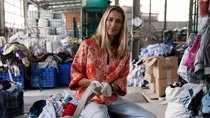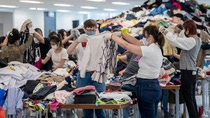“Without any hesitation, the industry has had a wake-up call.”
Media
We need a revolution
Hong Kong-based environmental charity Redress is on a mission to reduce the environmental impact of the fashion industry. It works to inspire and educate consumers and designers, encouraging them to embrace the circular economy. Founder and Board Chair Dr. Christina Dean tells us that there is still much work to be done.
Born and brought up in the UK, Christina Dean didn’t expect to become a sustainable fashion activist. She first worked as a dentist, before retraining as a journalist. After moving to Hong Kong in 2007, she took on assignments covering the impact of industrial pollution. That opened her eyes to the environmental costs of the fashion industry. Within months, Dean had switched careers again, founding Redress, which claims to be Asia’s first nongovernmental organization focused on the fashion industry.
Can fashion ever be truly sustainable?
I think the answer is no, but a lot depends upon your definition of sustainability. Far too often, people think about sustainability in the fashion industry only in terms of environmental considerations. I did that too, for a long time. But it is more complicated than that. If you take a broad view, as the UN does with its sustainable development goals, then sustainability is about the economy, the environment and the social side of things. So let’s transfer this onto fashion. In an ideal world, the fashion industry would create truly closed-loop systems, with renewable fibers, recycled materials and a work situation that was fair and empowering for everyone involved. We have a long way to go, but we should aspire to get closer to that ideal.
What are the most critical issues facing fashion in terms of sustainability right now?
The most critical issue facing fashion today is the lack of circularity. We also have overconsumption; we have cheap fashion, and we have a lack of recycling.
That means we are putting pressure on the environmental and social dimensions of sustainability: We are screwing up the environment and we are driving down wages to make cheap clothes.
You might argue that fashion is succeeding economically, because the industry is making big bucks, but it is doing that in a hugely inefficient way. We are incurring vast costs to mitigate the environmental impact of the sector. And we are not capitalizing on what the Ellen MacArthur Foundation estimates is an economic opportunity of 500 billion U.S. dollars to transform the way clothes are designed, sold and used: switching to renewable inputs, ramping up recycling and increasing the utilization of the clothes we own.
Is the fashion industry aware that it needs to do better? And is the industry trying to do better?
Without any hesitation, the industry has had a wake-up call. If you look at the biggest fashion groups – the top 20 or so companies that account for most of the industry’s revenue – then I think we have seen significant progress in recent years. They’ve focused on efficiency improvements, carbon savings, waste reduction and on the working conditions in their supply chains.
But this is not enough. We urgently need actions outside the direct control of the big fashion players. That will involve supply chain partnerships and collaboration with other industries, from the fiber manufacturers and recycling companies to energy players and chemical companies. We are already seeing fashion companies making direct investments in renewable power projects, for example.
How could change be accelerated?
The fashion industry needs to make a lot of changes in a very short period. That’s actually the definition of a revolution, and we need a revolution. You can point at countless new developments in R&D labs around the world over the past ten or 15 years: in new materials, new fabrics and new processes that could achieve true circularity in the sector. Now we face the challenge to scale up all those great ideas. But scaling up costs money. Boston Consulting Group and Fashion for Good produced a great report a couple of years ago looking at the technology requirements for a circular fashion supply chain. It estimated that the fashion industry needs 20 to 30 billion U.S. dollars in financing every year until 2030 to develop and commercialize sustainable solutions and business models. Closing that gap will require the combined efforts of philanthropic organizations, venture capitalists, private investors, financial institutions – and the fashion industry itself.
But sustainability is not just a cost factor, it can also drive commercial returns: There’s now so much evidence that sustainable business plans and thoughtful environmental, social and governance (ESG) strategies lead to greater longterm profitability. One study of large firms found that companies with high ESG standards have seen their incomes and profits grow more than twice as fast as those that haven’t yet made it a priority.
I think that people in the C-suites have a carrot right in front of them, which is seizing the market opportunities offered by sustainability.
Can we leave it to the industry to achieve that revolution, or do governments and regulators also need to act?
I’m optimistic about the drive that many leaders – not all but most – in the industry have to improve the sustainability of their businesses. Nevertheless, you need regulation to achieve a fair playing field. But effective regulation is difficult to do. It takes a long time for governments to set up new rules. And they need to work with the industry to create regulations that can be implemented without destroying the sectors they are trying to reform. If governments get that wrong, the proposed regulations end up being abandoned, and you face another 20 years without a referee on the pitch.
That said, regulations can be a catalyst for change in the sector. A good example of that is France, which has introduced rules to stop large fashion businesses from incinerating unsold products that could be reused or recycled. That has sent these companies into a state of action: forcing them to rethink the way they handle their inventories.
“Our choices say something about the sort of world we would like to live in.”
How does your organization Redress help companies and consumers to improve the sustainability of fashion?
At Redress, we focus on both ends of the fashion life cycle. We work to educate consumers about the impact of their fashion choices. We want to empower them to buy less, buy better and take better care. We run a permanent take-back program for clothing in Hong Kong, and a permanent charity shop. We do pop ups, talks, exhibitions, digital publications and work with secondary schools.
And we work with fashion designers. Like most products, around 80 percent of the environmental impact of a garment is determined at the design stage. That’s the point where you can build circularity in. The centerpiece of our engagement with designers is the Redress Design Award, which is the world’s largest sustainable fashion design competition. In 2023, its 13th cycle, the award had 150 university partners across the world. Participants learn about sustainability through lectures and online courses, and the winner gets to work for a leading global fashion brand.
What about the role of the consumer in driving change?
The voice of the consumer is hugely influential on the decisions the big brands make, for example. What we buy really matters. And how we treat our clothing throughout its life cycle, too. Washing better, caring better, wearing longer, sharing – all this has a huge effect on our overall impact.
Our clothes are a wonderful way to express ourselves, but they also mean a great responsibility: Our choices say something about the sort of world we would like to live in.


About Dr. Christina Dean
Dean is a sustainable fashion advocate who has championed better practices in fashion for over 15 years: For example with the renowned Redress Design Award honoring young talents. She was listed as one of British Vogue’s Top 30 Inspirational Women.









